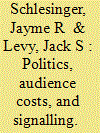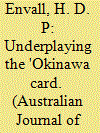| Srl | Item |
| 1 |
ID:
179372


|
|
|
|
|
| Summary/Abstract |
Audience costs theory posits that domestic audiences punish political leaders who make foreign threats but fail to follow through, and that anticipation of audience costs gives more accountable leaders greater leverage in crisis bargaining. We argue, contrary to the theory, that leaders are often unaware of audience costs and their impact on crisis bargaining. We emphasise the role of domestic opposition in undermining a foreign threat, note that opposition can emerge from policy disagreements within the governing party as well as from partisan oppositions, and argue that the resulting costs differ from audience costs. We argue that a leader's experience of audience costs can trigger learning about audience costs dynamics and alter future behaviour. We demonstrate the plausibility of these arguments through a case study of the 1863–4 Schleswig-Holstein crisis. Prime Minister Palmerston's threat against German intervention in the Danish dispute triggered a major domestic debate, which undercut the credibility of the British threat and contributed to both the failure of deterrence and to subsequent British inaction. Parliament formally censured Palmerston, contributing to a learning-driven reorientation in British foreign policy.
|
|
|
|
|
|
|
|
|
|
|
|
|
|
|
|
| 2 |
ID:
127059


|
|
|
|
|
| Publication |
2013.
|
| Summary/Abstract |
The US military bases in the Japanese prefecture of Okinawa have long been a source of domestic political opposition to the US-Japan alliance. As an alliance management issue, the ongoing troubles surrounding the bases raise questions as to when and why states adopt particular bargaining strategies when dealing with allies. Why, for instance, has the Japanese government not made greater use of this 'Okinawa card' when negotiating alliance issues with the USA? Even though highlighting particular domestic problems as a part of a negotiating strategy (known as tying hands) should appeal to a weaker ally such as Japan, this article argues that in the Okinawan case the reverse has been true. Japan has generally, though not always, sought to minimise or downplay domestic opposition to its alliance agreements, essentially preferring a cutting-slack to a tying-hands approach. The Japanese experience suggests that when states which are directly dependent on an alliance for their security see their security environment as unstable, they view tying-hands strategies as too likely to undermine their bargaining credibility. Maintaining credibility is important in an alliance bargaining context because it is a way for such states to signal their commitment to an alliance and so guard against abandonment.
|
|
|
|
|
|
|
|
|
|
|
|
|
|
|
|